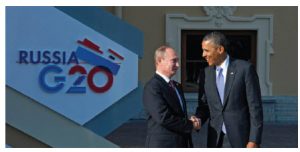
By every metric of soft power and hard power, the United States should be standing taller on the world stage. But the inconvenient truth is that it is not. Its ability to keep its friends and influence others is on the wane. A global realignment is happening before our very eyes. Traditional alliances are weakening or shifting. U.S. power and credibility in many different parts of the world are fading with deleterious consequences for global security and stability.
After the disastrous hit the U.S. took in the 2008-09 financial crisis and subsequent recession, its economy has rebounded. Job numbers are at an all-time low, suggesting that the U.S. economy is clocking close to what economists call “full employment.” U.S. growth is now three percent of GDP, a far cry from growth rates of earlier times, but still better than other G7 countries and the European Union, which is locked in a recessionary spiral. Income inequality is a serious problem in the U.S., as is its aging infrastructure (roads, airports and energy grids). Social entitlement programs, such as Social Security, Medicare and Obamacare will also cost the federal treasury heavily in the years to come.
Where the U.S. leads
However, the U.S. remains the world’s leader when it comes to technological innovation and the production of high value, capital-intensive goods. Its elite universities are still the best in the world, even though its public school system is in a shambles. Although military spending has been cut, the U.S. defence budget — roughly four percent of GDP — dwarfs those of its strategic rivals, such as China and fellow NATO members. More important, for the first time since the beginning of this century, U.S. armed forces are not involved in fighting a major war overseas. The mission in Afghanistan is winding down. American troops are providing training assistance to Iraqi government forces and U.S. airpower is being used against ISIS, but there is little prospect of a major land campaign in Iraq or anywhere else any time soon.
In some respects, things should be looking up. But they are not. The U.S.’s strategic rivals seem to be getting the better of it when it comes to gaining toeholds in some of the world’s most troubled neighbourhoods. There is also a growing global perception of a United States in decline.
Take Russia, for example. The Russian economy took a major hit after the drop in oil prices at the beginning of this year — Russia is a major energy producer and highly dependent on oil revenues. Although the Russian economy, along with the ruble, are now slowly recovering, the country’s long-term picture is not rosy. Its population is aging and will shrink faster than many G7 or G20 countries that are also growing old. Major capital outflows in the face of continuing instability, the dominance of Russia’s oligarchs in the economy, endemic corruption and crime and the absence of an effective rule of law are also damaging future growth.
By any objective indicator, Russia should not be a competitor to the U.S. and the West, but you would never know it by President Vladimir Putin’s swagger and “in-your-face” behaviour.
Putin’s big britches
Putin is clearly thriving on the domestic support his takeover of Crimea and Russian separatist efforts in Eastern Ukraine have generated. Perversely, his actions flouting basic international norms have also inspired popular support for him in Europe, where he is well-liked by the left and extreme right in a region where “strong” leaders are in short supply.
The NATO Alliance is fumbling badly in its efforts to deal with the complexities of the evolving situation on Europe’s eastern flank and the cracks in the alliance over how to deal with Russia point to a further erosion of U.S. influence and leadership. Whereas the Baltic States and Britain generally favour a tough line on Putin and a ratcheting up of economic sanctions in the face of flagrant violations of the Minsk accords, Germany and France don’t want to rock the boat until the current package of sanctions expires in July. Germany’s Angela Merkel, for example, has signalled that the sanctions should stay in place until Russia abides by its Minsk commitment to lay down arms.
The leaders of the Baltic States worry openly that they will be next on Putin’s dinner list. And they are right to be worried. In the current climate, no one seriously believes that U.S. President Barack Obama or Europe’s leaders will risk war with Russia over Estonia and Putin knows that, too. The U.S. penchant to “lead from behind” has not inspired, nor has Obama’s refrain about not “doing stupid stuff.” As Columbia University scholar and defence expert Richard Betts pointed out some years ago in an article in the National Interest, since the end of the Cold War, NATO has faced an identity crisis of its own. It has been unable to decide whether it wants to play “the enforcer and the pacifier of conflicts beyond the region’s borders;” “the gentleman’s club for liberal and liberalizing countries of the West;” or “the residual function of an anti-Russia alliance.” That identity crisis has now hit a critical stage as the Russian bear puts its paws on NATO’s doorstep.
The ink was barely dry on the much-ballyhooed nuclear deal with Iran before Russia announced it would be lifting sanctions and removing legal restrictions on the sale of S-300 mobile surface-to-air missiles. Russia is also supplying grain and construction equipment to Iran in exchange for crude.
Russia, Iran and the Middle East
Russia is also doing everything it can to project its influence in the Middle East by giving generous dollops of economic and military assistance to Syria’s embattled leader, Bashar al-Assad, and even reaching out to Egypt’s Muslim Brotherhood before it was toppled from its perch. Its biggest friend in the region is Turkish President Recep Tayyip Erdogan, who has rolled out the red carpet for Putin and perhaps even sees him as something of a role model when it comes to the heavy-handed exercise of power and treatment of political dissidents and journalists. Notwithstanding the fact that Turkey is a NATO member and protested Russia’s invasion of Crimea, Russia and Turkey have signed a protocol on a gas deal that would see Russia ship gas through Turkey and would represent a major boost in bilateral trade.
As Russia’s influence expands in the Middle East, U.S. relations with its allies and friends in the region have frayed and fractured. Relations with Israel, which rarely saw much common ground when it came to the broader politics of the region — Israeli-Palestinian relations perhaps being the exception — are now so deeply polarized over Obama’s nuclear deal with Iran that any vestiges of a “special relationship” have all but evaporated in the ensuing acrimony. The Iran deal is already showing it is potentially destabilizing for the region, for nuclear proliferation and for American credibility.
It is also making for strange bedfellows. The deal has brought Israel closer to Saudi Arabia and the Gulf States, which share similar existential fears about Iran’s nuclear intentions and aspirations for greater regional influence — if not domination — through its support for the Shiite-led government in Iran, its backing of Syria’s Assad and the mischief Iran continues to play on the borders of Israel and Saudi Arabia respectively through its support for Hezbollah, Hamas and Yemen’s Houthi-led insurgency. Israel and much of the Sunni Arab world see the agreement with Iran as a bad deal that will do little to curb Iran’s nuclear appetites, especially when sanctions are lifted and the Iranian economy rebounds. In fact, there is greater likelihood now, even if a final nuclear agreement with Iran is concluded, that Saudi Arabia will look to Pakistan, a close ally, to help it develop its nuclear capabilities to counterbalance Iran.
Clumsy attempts in Iran
No matter how noble Obama’s intentions to untie the Gordian knot in U.S.-Iranian relations and put Iran’s nuclear genie back in the bottle, his handling of negotiations with U.S. allies in the region has been clumsy and done little to dispel mounting concerns that the U.S. is weak, desperate for a deal — any deal — and is in retreat.
Perceptions of American weakness have also emboldened North Korea’s erratic and unpredictable regime, which has quietly been building up its nuclear arsenal and long-range missile capabilities, to the alarm of China and South Korea. The countries of Southeast Asia are also concerned about Chinese territorial claims in the South China Sea and the flexing of its military muscles.
The American “pivot” towards the Asia-Pacific rings increasingly hollow in a region where key American allies, such as South Korea and Japan, still feel their security interests are being ignored by Washington. Although negotiations for a Trans-Pacific economic partnership (TPP) are moving forward with the support of a Republican-dominated Congress, the TPP’s “China containment” message sends mixed signals because Chinese co-operation is needed to deal with North Korea’s mounting challenge to regional, if not global, stability. When it comes to the Korean peninsula, the pivot needed is one involving the U.S. and China.
Even Bretton Woods institutions, such as the International Monetary Fund (IMF), World Bank, World Trade Organization and Inter-American Development Bank, which have been the cornerstones of the post-war liberal international economic order, are crumbling and dysfunctional. Washington bears much of the blame.
Look no further than Britain’s just-announced decision to join the Asian Infrastructure Investment Bank (AIIB), which is a Chinese-led initiative born out of Beijing’s frustration at not getting its fair share of voting rights in the World Bank. Repeated attempts to reform the World Bank and International Monetary Fund, by giving emerging market economies such as China a bigger voice have floundered on the rocks of an intransigent U.S. Congress.
Australia considers China’s program
Even Australia is now making a bid to join the AIIB and is not overly worried about courting Washington’s wrath. That is not surprising, given that China is its No. 1 trading partner. Australia has always struck a delicate balance between its strong security ties with the United States and its need to do business with Asia. Nevertheless, the balance now seems to be tilting towards China even under Tony Abbott, Australia’s hawkish conservative prime minister.
Already, some of Asia’s best-known public intellectuals, such as Singapore’s Kishore Mahbubani, are heralding the defection of U.S. allies to the AIIB as “the end of the American century and the arrival of the Asian century.”
Many believe that the Obama administration is now moving into what can euphemistically be described as “legacy” mode as the electoral campaign for a new president moves into high gear. But an unseemly rush to conclude new peace treaties or trade agreements without thinking through the consequences will prove damaging to American and Western interests in the long run.
Former U.S. secretary of state Henry Kissinger has reportedly said that the world is in more turmoil today than at any time since the Second World War. Perhaps, but there is certainly no one of stature in the West, notably in Washington, to inspire confidence, let alone stability. Perceptions of weakness in one region are infectious. A New York Times editorial in April of this year cautioned “concern is growing in many quarters that the U.S. is retreating from global leadership just when it is needed most.”
Derek H. Burney is senior strategic adviser to Norton Rose Fulbright and was Canadian ambassador to the United States from 1989 to 1993. Fen Osler Hampson is a distinguished fellow and director of Global Security at the Centre for International Governance Innovation and Chancellor’s Professor at Carleton University. They are the authors of Brave New Canada: Meeting the Challenge of a Changing World.





